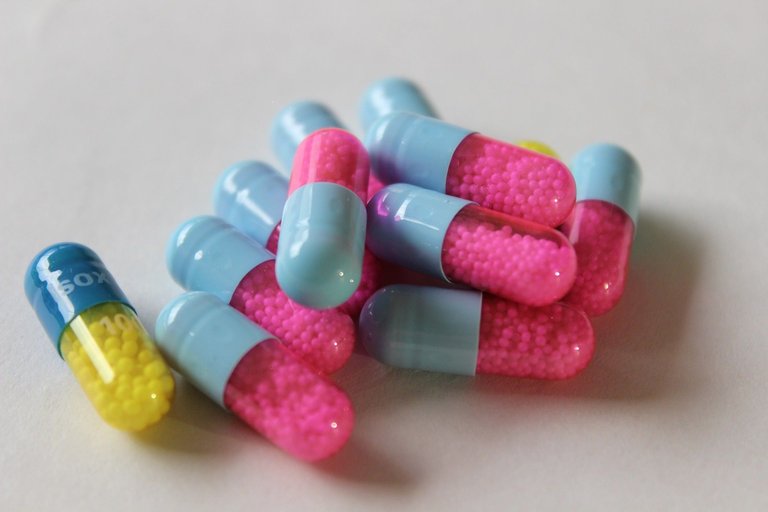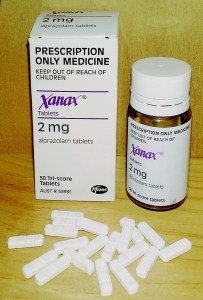
In some cases, Xanax (Alprazolam) may very well be a worthwhile option for people who are ridden with constant anxiety.
But a particular few non-pharmaceutical options for treating anxiety and panic attacks exist; these alternatives are colloquially known as natural Xanax.
Xanax is a common prescription anti-anxiety drug, specifically a benzodiazepine. It was first released in 1981 and ranks in the top 10 most commonly prescribed medications in the United States for anxiety (as of 2016).
It is currently a controlled substance in the U.S. and works by modulating the activity of gamma-aminobutyric acid (GABA) and the central nervous system.

Many users that take Xanax report significant sedative and hypnotic effects, thereby helping alleviate feelings of anxiety and depression.
However, Xanax appears to come with a long list of possible side effects, such as xerostomia (dry mouth), dizziness, constipation, and disinhibition. This leads many potential Xanax candidates to wonder if the benefits are worth the drawbacks.
Naturally, interest in alternative treatments, such as natural Xanax, is rapidly increasing. To learn more about natural Xanax and its potential benefits, read on.
What Exactly Is Natural Xanax?
The term natural Xanax is rather ambiguous and vague since it doesn’t refer to any specific ingredient/nutrient. Rather, many people use natural Xanax as a catch-all term for any natural nutrient that induces similar anxiolytic activity (especially through GABA modulation).
We cover a wide range of ingredients here on Anxiety Hack that work much like Xanax, albeit without the negative ramifications and addictive properties.
These ingredients include things like L-theanine, GABA, Phenibut, and Kava Kava.
But to understand why natural Xanax is more pragmatic for anxiety requires better comprehension of how Xanax works.
How Xanax Works
Xanax, along with other benzodiazepines like Valium, are a class of drugs that enhance the effects of GABA – an inhibitory neurotransmitter in the central nervous system. In turn, GABA may modulate the function of systems in which serotonin, dopamine, and other neurotransmitters act to create a restful, calm state.
Since GABA is an inhibitory neurotransmitter, increasing its activity results in anticonvulsant, hypnotic, muscle relaxant, and ataxic effects. Think of it like the inverse of caffeine, which stimulates the central nervous system (and can potentiate anxiety).
Moreover, Xanax significantly alters awakening, sleep, and rapid eye movement (REM) states by regulating brainwave activity. Research suggests that Xanax significantly decreases the length of REM periods and the frequency of REM burst activity.[1]
REM sleep is the stage of sleep where dreaming typically occurs, and paradoxically exhibits similar brain physiology to an awake state. In fact, energy use by the brain during REM sleep equals or surpasses energy use during waking hours.

Therefore, by reducing REM sleep length and frequency, Xanax may help users get more restful, slow wave sleep.
It’s important to note that all of these effects derive from GABA modulation. Thus, natural ingredients that exhibit similar physiology to Xanax (i.e. natural Xanax) can also induce relaxation, better sleep, and feelings of well-being.
Efficacy Of Xanax And Natural Xanax For Treating Anxiety
What’s particularly worrisome about chronic Xanax use is that nearly 40% of users report having excessive drowsiness and lightheadedness.[2]
In this regard, taking Xanax may impede your ability to be productive and function properly throughout the day. While anxiety and panic attacks are certainly inhibiting on one’s lifestyle, being constantly sleepy and nonchalant isn’t great either.
By the same token, a large body of evidence suggests Xanax is indubitably an effective medication for treating anxiety.[3] During these studies, symptoms of anxiety are measured by the Hamilton Anxiety Rating Scale (HARS).
Scores higher than 18 on the HARS are indicative of general anxiety disorder (GAD). Studies corroborate that Xanax tends to be as effective (if not more) than Valium for treating clinical anxiety disorders.
Moreover, Xanax tends to act rapidly in users. After just one week of therapy, users typically report improvement in total symptom scores on the HARS. These improvements are usually associated with better mood, fewer feelings of guilt, and a decrease in suicidal ideation.
Curiously though, the improvements in HARS scores tends to plateau around week three, where many users report feeling “a little better”.
Is Natural Xanax Better?
If you’re considering a natural Xanax alternative, you might want to try L-theanine – a non-dietary amino acid derived from green tea leaves.
The advantage of L-theanine versus Xanax is that the former will not make you drowsy, nor will it inhibit your cognitive function. In fact, L-theanine can simultaneously boost your mental capacity while reducing anxiety.

A recent study showed that a dose of 250mg of L-theanine per day was safe and had multiple beneficial effects on depressive symptoms, anxiety, sleep disturbance and cognitive impairments in patients with major depressive disorder.[4]
What’s especially pertinent to consider is that L-theanine (and other forms of natural Xanax) tend to have fewer side effects. Xanax may be effective for reducing anxiety and frequency of panic episodes, but the side effects are generally harsher than natural Xanax alternatives.
Want to learn more about how various ingredients act like natural Xanax? Check out our L-theanine, GABA, Phenibut, and Kava Kava overview!
References
[1] Chowdhury, Z. S., Morshed, M. M., Shahriar, M., Bhuiyan, M. A., Islam, S. M. A., & Bin Sayeed, M. S. (2016). The Effect Of Chronic Alprazolam Intake On Memory, Attention, And Psychomotor Performance In Healthy Human Male Volunteers. Behavioural Neurology, 2016.
[2] Charney, D. S., Woods, S. W., Goodman, W. K., Rifkin, B., Kinch, M., Aiken, B., … & Heninger, G. R. (1986). Drug Treatment Of Panic Disorder: The Comparative Efficacy Of Imipramine, Alprazolam, And Trazodone. The Journal Of Clinical Psychiatry.
[3] Naveed, S., & Qamar, F. (2014). Comparative Study Of Different Brands Of Alprazolam. Global Journal Of Medical Research, 14(3).
[4] Akhondzadeh, S., Gerbarg, P. L., & Brown, R. P. (2013). Nutrients For Prevention And Treatment Of Mental Health Disorders. Psychiatric Clinics Of North America, 36(1), 25-36.
Very interesting
You've been UpVoted via the UpVote Experiment 002 Bot. Depending on my VP & the price of STEEM you should get a $.01-$.03 for your trouble.
Read more about this experiment here.
Thank You - @blueorgy
Congratulations @anxietyhack! You have received a personal award!
Click on the badge to view your Board of Honor.
Do not miss the last post from @steemitboard!
Participate in the SteemitBoard World Cup Contest!
Collect World Cup badges and win free SBD
Support the Gold Sponsors of the contest: @good-karma and @lukestokes
Congratulations @anxietyhack! You received a personal award!
You can view your badges on your Steem Board and compare to others on the Steem Ranking
Do not miss the last post from @steemitboard:
Vote for @Steemitboard as a witness to get one more award and increased upvotes!